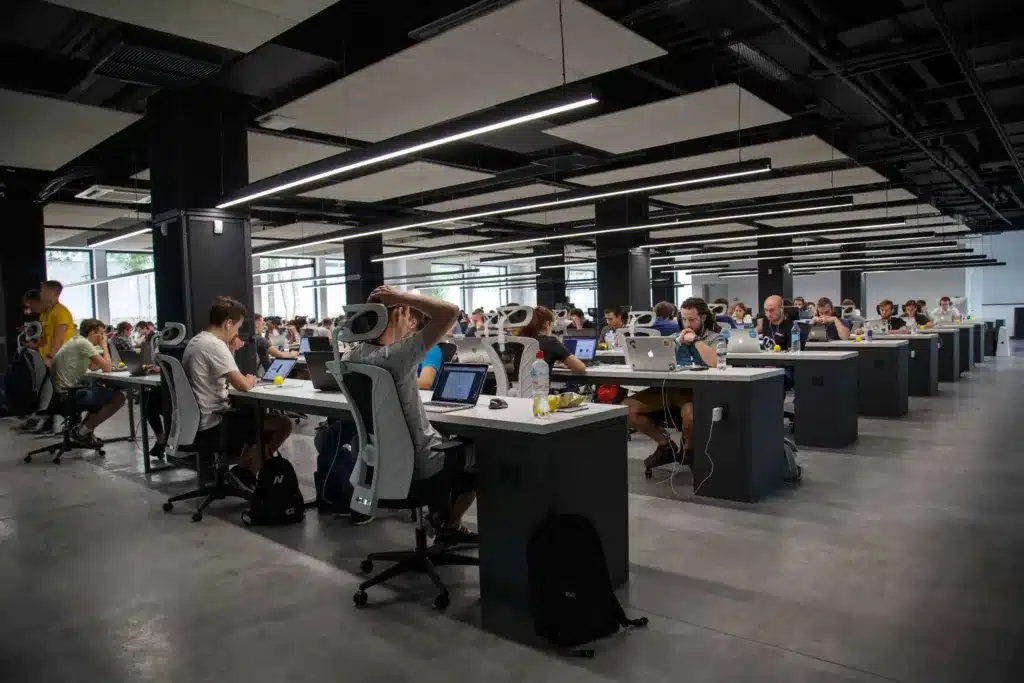Will AI Take My Job? - Looking For Jobs AI Will Not Replace
Artificial Intelligence (AI) is becoming more and more widespread in our daily lives. It helps automate repetitive and tedious tasks, making various industries more efficient.
However, more and more people ask, “Will AI take my job?”.
On top of that, Sam Altman – the CEO of OpenAI and creator of ChatGPT – in his recent interview highlighted that AI will not only assist human work but will also replace a number of jobs.
In this article, we will discuss some jobs ai will not replace in the foreseeable future.
Jobs AI Will Not Replace


Disclosure: This post may contain affiliate links, and if you decide to buy any of the promoted products, I may receive a commission at no additional cost to you. By doing this, I might feel more inspired to continue writing on this blog. You can read our affiliate disclosure in our privacy policy.
Table of Contents
While some people perceive ChatGPT and other AI tools as helpful aids to human work, Altman believes that certain jobs will inevitably be wiped off due to advancements in AI technology.

The impact of AI on the workforce has been both positive and negative. While it helps make certain jobs easier and more efficient, it has also led to concerns about the potential loss of jobs, particularly those that are repetitive and can be automated. Jobs that AI might replace include those in manufacturing, data entry, and customer service.
However, there are still numerous jobs that AI will never replace, particularly those that require a human touch. Let’s explore various careers that require qualities that AI may lack.
Emotional Intelligence Jobs

Emotional intelligence is one of the top factors that sets humans apart from machines. This term refers to the ability to understand and manage our emotions. It’s the ability to empathize with others, communicate effectively, and navigate complex social situations.
Social workers
A key role that requires emotional intelligence is that of a social worker. Social workers interact with diverse individuals and address complex social issues.
While AI can crunch data, they lack the emotional and empathic capacity to understand and address human problems.
Counselors and therapists
Counselors and therapists are another group of professionals whose jobs require emotional intelligence. They work with individuals who are in distress and need support.
While AI could help, it’s unrealistic to imagine a world where people would prefer a machine to a human regarding their mental and emotional well-being.
Human resource professionals
Human resource professionals are responsible for creating an environment that fosters productivity and employee satisfaction. This requires a deep understanding of human behavior and emotional intelligence.
AI may assist in some HR functions but can’t replace human intuition and communication skills.
Teaching and training
A crucial aspect of teaching and training is creating a connection with students. It’s the empathic and communicative skills of teachers that create a nurturing environment for students to learn.
While AI can deliver info and data, it cannot provide the personal touch necessary for learning.
Manual Labor Jobs

One of the advantages humans have over AI is our physical abilities. Jobs that require physical work, such as gardeners and landscapers, construction workers, and personal trainers, are safe from being automated by AI.
Gardening and Landscaping
Regarding gardening and landscaping, AI must have the necessary skill and intuition to handle the job. Tending to plants and creating beautiful outdoor spaces requires creativity and finesse beyond the capabilities of current AI technologies.
Of course, there are AI apps that can help you identify plant diseases and schedule watering times. But the experience of watching a gardener work their magic is truly something special, something that a machine can never replicate.
Construction work
Construction work is another area in that AI has little to no impact. While machines can be programmed to do heavy lifting or print a 3D house, they cannot make decisions or solve problems like humans.
Construction work requires physical power, problem-solving skills, and critical thinking, both of which are difficult to replicate in an AI system.
Personal Trainers and Coaches
Similarly, personal trainers also require a level of human interaction that AI cannot provide.
While even Chat GPT can create workout routines, it cannot provide the motivation and energy a real-life trainer can.
Creative Jobs

When we think of creative jobs, often the first professions that come to mind are artists and musicians.
However, creativity is essential for various jobs, from fiction writers to chefs.
The ability to come up with new ideas and solutions to problems can’t be easily replicated by artificial intelligence.
Writers and Authors
Novelists, playwrights, and poets are all examples of writers and authors who require creativity to succeed.
While AI can certainly help with tasks like grammar checking and even generating basic text, it still needs to replicate a human writer’s imagination and unique voice.
After all, where would we be without the likes of Shakespeare, Toni Morrison, and J.K. Rowling?
Graphic Designers
Graphic designers use their creative skills to create visual content for websites, advertisements, and more.
While tools can help automate some design tasks, such as resizing images or adjusting colors, human ingenuity’s still needed when coming up with the initial concept and design.
Plus, many designers would argue that the imperfections and unexpected variations that come with a human design add character that a machine can’t replicate.
Chefs and Cooks
Cooking is a craft that requires both technical skill and creativity. Chefs and cooks constantly experiment with new flavors and ingredients to create imaginative and delicious dishes.
While applications available can generate recipe ideas based on specific parameters, such as available ingredients or dietary restrictions, they can’t replicate the human taste buds and intuitive sense of what flavors work well together.
Jobs that require critical thinking

Judges, Lawyers, and Investigators
AI tools are increasingly used in legal and investigative fields to analyze complex information.
Algorithms can rapidly process volumes of data to identify patterns and connections. This analytical ability allows AI to aid professionals like lawyers and investigators in several ways.
For example, AI can review legal documents highlighting relevant passages and case law.
To find correlations, it can also compare different evidence like financial records, witness statements, and surveillance footage.
However, while AI excels at analysis, applying those insights requires more judgment and contextual understanding.
Human professionals must take AI-generated research and interpret the findings based on nuance, ethics, and experience.
An AI cannot adapt evidence and arguments on its feet in court like a lawyer can. Nor can algorithms determine motive from behavioral patterns like an investigator.
The human factor remains essential to put analytical insights into action judiciously.
The future role of AI will be to enhance professionals’ capabilities, not replace their skills.
By coupling human discernment with AI’s analytical power, legal and investigative fields can continue upholding justice while benefiting from technological advances.
But in the foreseeable future, it will be humans applying intelligence, not artificial intelligence alone, that preserves the integrity of these professions.
Human Insight Jobs

While AI excels at various tasks and can analyze large data sets quicker than humans, it still lacks the human insight that people possess.
Human insight is the ability to understand, interpret and act on information that is not obvious.
It encompasses intuition, emotional intelligence, and the ability to read body language. It is a crucial factor for success in many industries.
CEO’s and leaders
While AI can analyze data and provide insights, it cannot replace human intuition and experience. This is particularly true for leaders in companies.
They need to make complex decisions that take into account multiple factors.
Human insight plays a significant role in decision-making as it requires understanding the human facets of a decision.
Financial Advisors
Financial decisions can be complex, and a great deal rides on them. This is where human insight comes in handy, as advisors must interpret their client’s motives and desires.
Client emotions weigh heavily on financial decisions, and understanding their motivations is essential for advising. Human empathy is difficult to replicate artificially.
Political Advisors
The core of politics revolves around human psychology, which makes human insight indispensable in this field.
Advisors need to be able to connect with individuals and understand their fears and aspirations.
AI might excel at analyzing election data analytics, but it lacks the ability to make strategic decisions or feel empathy for the individuals politicians work for.
People want to talk to another human being about important life decisions.
Whether it be a financial crisis or a health scare, people prefer compassion and empathy, attributes that can only come from another human being.
Therefore, while AI might become integral to these industries, human interactions will retain their value.
Jobs With a Personal Touch

Hairdressers, Stylists and Make-Up Artists
In some industries, having a personal touch is essential.
Hairdressers, stylists, massage therapists, and salespeople all require a human connection that AI can’t replicate.
Think about it – when you’re getting your hair cut, you want to be able to talk to your stylist about your day or ask them for advice on how to style your hair.
You want to feel like more than just a number on a list. The same goes for massage therapists – you want to be able to tell them where you’re feeling tense and have them customize the massage to fit your needs.
And salespeople have to be able to read your body language, understand your needs, and sell you on a product. It takes a special touch to do all of that.
AI can’t replicate that. It doesn’t understand emotions or how to read body language.
It can’t connect with you personally or understand your needs beyond what’s programmed into it.
And while AI might be able to suggest a product for you based on your shopping history, it can’t sell you on it in the same way a person can.
Benefits and Drawbacks of AI

There’s no doubt Artificial Intelligence (AI) has made a big impact on the job market. Its speed, efficiency, and reliability have changed how work gets done. But like any new technology, AI also has pros and cons.
Let’s look at the main advantages and disadvantages of AI in the workplace.
One big plus is AI improves efficiency and productivity. AI systems can do tasks faster and more accurately than humans.
This saves time and resources for other important work. By combining AI’s power with human skills, companies can increase output without overstretching.
Another benefit is that AI offers cost-effective solutions. Using AI across industries can reduce the costs of hiring and training more workers. In fact, more and more people will start side hustles since many tasks can be done by one person with the help of AI.
Once running, AI systems work around the clock without inflating labor costs.
Reducing human error is another pro. AI systems don’t make mistakes if programmed right. This lowers the risk of processing errors and improves data analysis and reporting.
But AI also has some drawbacks. Job loss and unemployment are major concerns as AI automates routine tasks. However, jobs needing human qualities like creativity are safer.
Also, AI can potentially introduce bias in hiring, causing discrimination. This could hurt customer experiences if not addressed.
Finally, lacking the human touch with AI could be a disadvantage. Customers often prefer support from real people who understand emotions.
In the end, it’s up to employers and workers to ensure AI’s benefits outweigh its challenges.
Preparing for the Future of AI in Jobs

We cannot stop the wave of AI that is coming our way. But we can certainly prepare ourselves for its arrival. Here are some key ways to prepare for the world where AI is a job partner.
First and foremost, it is important to learn new skills. For example, if you are a web-designer, you have to leverage some latest AI tools in your work. This is not just a way to ensure employability but also to stay relevant.
With technological advancements, learning new skills has become easier than ever before. The world is becoming more interdisciplinary and going beyond conventional disciplinary boundaries. So be open to new opportunities and embrace them. Collaboration with AI is another way forward.
The relationship between humans and AI should be collaborative instead of seeing it as a zero-sum game. For instance, think of this confluence – AI can perform routine tasks better, and automation can positively impact productivity. By collaborating with AI technology, we can only enhance its potential while also benefiting from it. The job market is dynamic, and so is the way we work.
Therefore, we must prepare for the dynamic job market by being agile and adaptive. We can no longer afford to be complacent if we want to stay ahead of the game. The foreseeable future belongs to those who can adapt to the changing landscape. Lastly, upskilling and reskilling will be essential as AI takes over routine and repetitive tasks.
The future job market will require new skills, and the ability to reskill will give an edge to individuals. Some skills that will be in demand in AI include emotional intelligence, creativity, and problem-solving.
Preparing for the future of AI in jobs does not mean being averse to change. Instead, it means being more open to change and learning. We must be willing to adapt and evolve, as that will be the new normal. Let’s embrace the future together with AI.
Conclusion
In summary, AI’s potential impact on the labor market in a 15 to 25 years time frame is hard to underrate. And it is already replacing some jobs and creating new ones. We must embrace change, learn new skills, and collaborate with AI to remain relevant. The future of work is unpredictable, but with the right mindset, you can prepare for it.
Disclosure: This post may contain affiliate links, and if you decide to buy any of the promoted products, I may receive a commission at no additional cost to you. By doing this, I might feel more inspired to continue writing on this blog. You can read our affiliate disclosure in our privacy policy.
Editorial process: My reviews always result from real-world experience. Read my Editorial Guidelines to learn more.
The posts may contain affiliate links. However, this never impacts my commitment to honest, unbiased recommendations. If you decide to buy any of the promoted products, I may receive a commission at no additional cost. By doing this, you inspire me to create helpful and engaging content. You can read about affiliate disclosure in the privacy policy.
We improve our products and advertising by using Microsoft Clarity to see how you use our website. By using our site, you agree that we and Microsoft can collect and use this data. Our privacy statement has more details.

